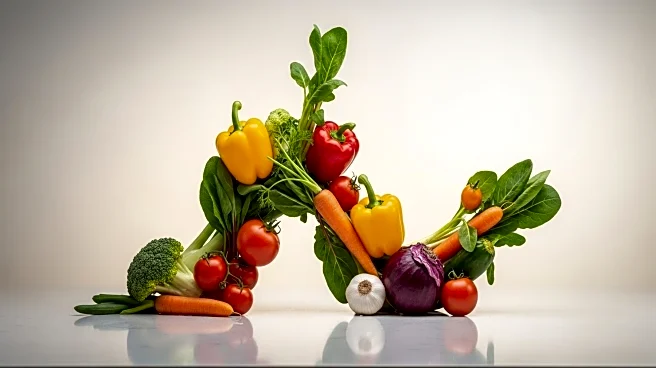What is the story about?
What's Happening?
The hydrolyzed vegetable protein (HVP) market is experiencing significant growth, driven by increasing consumer demand for natural flavor enhancers and plant-based ingredients. The market, which surpassed USD 3.65 billion in revenue in 2025, is projected to reach USD 5.13 billion by 2033, growing at a compound annual growth rate (CAGR) of 4.35%. This expansion is largely attributed to the rising popularity of clean-label products and the growing vegan and vegetarian populations. HVP serves as a versatile protein source for various food applications, including snacks, soups, sauces, and seasonings. The soy segment holds the highest market share due to its rich amino acid content and widespread availability. Acid hydrolysis is the leading process in the market, favored for its cost-effectiveness and ability to produce large quantities of flavor-enhancing protein ingredients.
Why It's Important?
The growth of the hydrolyzed vegetable protein market reflects broader consumer trends towards health-conscious and sustainable food choices. As more consumers seek plant-based and natural ingredients, food manufacturers are increasingly incorporating HVP into their products to meet these demands. This shift not only supports the expansion of the convenience food market but also aligns with global interests in plant-derived protein alternatives. The U.S. market is particularly significant, with manufacturers innovating in flavor enhancement and protein fortification. The expansion of HVP usage in food products could lead to increased market opportunities for companies specializing in plant-based ingredients, potentially influencing food industry standards and consumer preferences.
What's Next?
The hydrolyzed vegetable protein market is expected to continue its growth trajectory, driven by ongoing innovations in plant-based food formulations. Companies like Roquette are introducing new multifunctional pea proteins, offering creative possibilities for taste and texture in plant-based foods. As consumer awareness of health and nutrition increases, the demand for clean-label and plant-based products is likely to rise, further boosting the HVP market. Food manufacturers may continue to explore new applications for HVP, expanding its use in meat alternatives and other processed foods. The market's growth could also prompt increased competition among key players, such as Kerry Group and Ajinomoto, as they seek to capitalize on the expanding demand.
Beyond the Headlines
The expansion of the hydrolyzed vegetable protein market may have deeper implications for the food industry, including ethical and environmental considerations. As consumers become more conscious of the environmental impact of their food choices, the demand for sustainable and plant-based ingredients could drive further innovation in the sector. Additionally, the shift towards natural flavor enhancers may influence regulatory standards and labeling practices, as companies strive to meet consumer expectations for transparency and sustainability. The market's growth could also contribute to broader cultural shifts towards plant-based diets, potentially impacting global food consumption patterns.
















